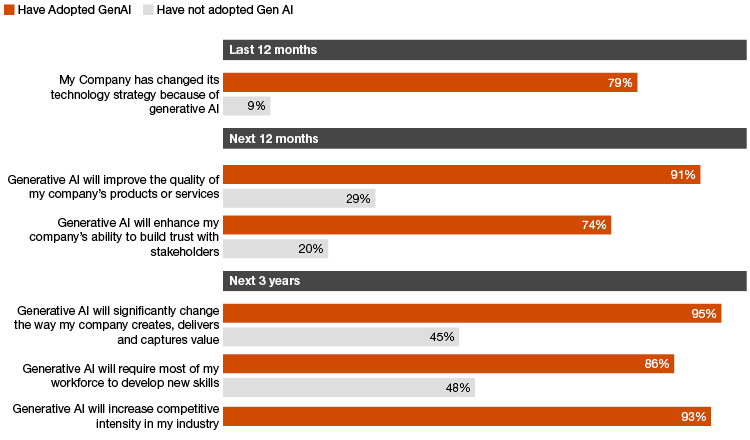
Unlocking the power of GenAI: key factors driving adoption
When it comes to GenAI’s business impact, adopting is believing. Our latest CEO Survey reveals that Irish CEOs who have embraced GenAI report significantly higher confidence levels than those yet to adopt the technology, highlighting GenAI’s transformative potential for business.
Question to Irish CEOs: To what extent do you agree or disagree with the following statements about Generative AI?
(Showing only ‘agree’ responses)

For chief technology officers (CTOs) navigating scepticism and uncertainty surrounding GenAI, the survey findings provide a compelling case for adoption. This is further supported by PwC research demonstrating the substantial value boost across various industries when GenAI is integrated into existing operating models and optimally utilised for business model reinvention. As CTOs drive the implementation process, they should prioritise the following five imperatives:
Balance risk and reward: While adopting GenAI can alleviate doubts about its impact, the CEO Survey suggests that concerns about potential risks can persist. CTOs must address CEOs’ concerns and collaborate with technical, legal and other leaders to mitigate threats. Implementing a Responsible AI framework that establishes clear guidelines for data ethics, policy, governance, bias, fairness, compliance and monitoring is a crucial starting point.
Integrate GenAI with existing digital strategies: GenAI has the greatest impact when applied to existing digital tools, tasks, environments, workflows and datasets. Aligning your digital strategy with your overall organisational objectives is essential for maximising the benefits of GenAI.
Decentralise experimentation: GenAI’s diverse capabilities are best leveraged when individuals familiar with specific tasks identify high-value, business-specific applications. Centralised control of GenAI deployment may overlook specialised use cases that could provide a competitive edge. Encourage internal initiatives that engage individual workers and departments in experimentation and exploration to uncover these opportunities.
Have a plan for managing productivity gains: GenAI enables companies to reinvest productivity gains to enhance quality, volume, or production speed, reduce labour input to cut costs or pursue a combination of both. Developing a plan to manage these gains requires answers to critical questions, such as how to effectively redeploy employees whose skills have become redundant due to GenAI capabilities.
Prioritise employee buy-in: The success of GenAI adoption hinges on addressing the impact on your workforce from the outset. To position your organisation for success, engage employees in creating and selecting AI tools, invest in AI education and training, cultivate a culture that embraces human-AI collaboration and data-driven decision-making, and support employee-led innovation.
Ensuring workforce alignment is crucial for any new adoption. By prioritising these steps and keeping people at the centre of the change, businesses can successfully harness the power of GenAI technology, create lasting value and maintain a competitive advantage in the market.











Menu